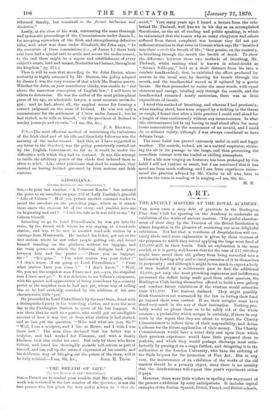"THE BREATH OF LIFE."
(To TRE EDITOR OF THE "SPECTATOR:1 SIR,—Permit me to remind your readers that Mr. Catlin, whose work was reviewed in the last number of the Spectator, is not the first person who has given the very useful advice to " Shut the
mouth." Very many years ago I heard a lecture from the cele- brated Mr. Thelwall, well known in his day as an accomplished elocutionist, on the art of reading and public speaking, in which he maintained that the reason why so many clergymen and others suffered from throat complaint was because they did not pay sufficient attention to that verse in Genesis which says He " breathed into their nostrils the breath of life ;" they persist, on the contrary, in breathing through the mouth the breath of death. To show the difference between these two methods of breathing, Mr. Thelwall, whilst reciting what is known in school-books as "Satan's Soliloquy," held at a short distance from his face a cambric handkerchief ; first, lie exhibited the effect produced by orators in the usual way, by drawing his breath through the mouth, and the handkerchief waved as if agitated by a gentle breeze. He then proceeded to recite the same words, with equal clearness and energy, inhaling only through the nostrils, and the handkerchief remained nearly motionless, there was so little expenditure of breath.
I tried this method of breathing, and whereas I had previously, when reading aloud, been soon stopped by a tickling in the throat or cough, I found that after a little practice I could read aloud for a length of time continuously without any inconvenience. In after life, circumstances led to my having to read aloud often for many hours consecutively for the amusement of an invalid, and I could do so without injury, although I was always considered to have delicate lungs.
The same habit has proved extremely useful in cold and foggy weather. The nostrils, indeed, act as a natural respirator, strain- ing the air in its passage to the lungs, and thus preventing the immediate contact with the loaded or chilling atmosphere.
That a life now verging on fourscore has been prolonged by this habit I will not venture to assert, but I am convinced that it has saved me from much suffering, and I can from experience recom- mend the practice advised by Mr. Catlin to all who have to exercise the voice in reading or in singing.—I am, Sir, &c., M. R.


































 Previous page
Previous page